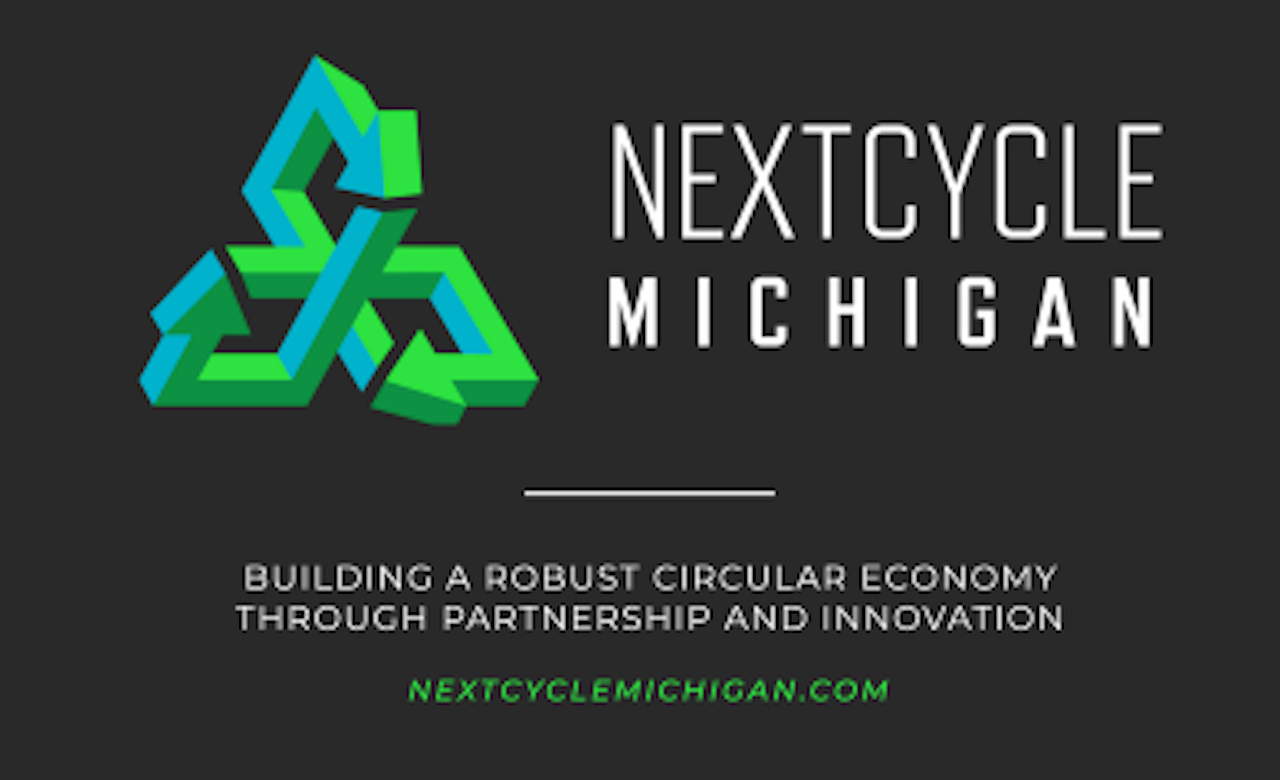Kickoff highlight includes EGLE’s award of record-setting combined total of $4.9 million in Renew Michigan recycling grants to 45 community, business and nonprofit recipients in almost every region of the state
LANSING – Leaders of the Michigan Department of Environment, Great Lakes, and Energy (EGLE) joined today with the Michigan Chamber of Commerce, bipartisan lawmakers and Meijer to announce NextCycle Michigan, hailed as the largest collaborative effort in state history to spark the state’s “recycling and recovery” economy.
As part of the NextCycle Michigan initiative, EGLE announced that already in 2020 and 2021, $97 million is being committed to recycling projects through partners that in addition to Meijer include: Henry Ford Health System, GFL Environmental, Carton Council of North America, Goodwill Industries, Keurig Dr Pepper, Foodservice Packaging Institute, U.S. Business Council for Sustainable Development, Emterra Environmental, Washtenaw County, Great Lakes Tissue and more than 30 Michigan companies, organizations and nonprofits.
“The NextCycle Michigan Initiative and Renew Michigan grants marks the largest push in state history to promote recycling activities that divert materials from Michigan landfills, boost local economies, and support Gov. Whitmer’s climate change priorities through reductions in greenhouse gas emissions,” EGLE Director Liesl Clark said during a virtual press conference.
Emterra, for example, is opening this month a new $9 million recycling sorting facility built through a collaboration with the cities of Lansing and East Lansing. The facility will use state-of-the-art robotics to process recyclables from more than 676,000 households across 12 counties in and around the Capital-area, increasing access to recycling throughout the region and creating new jobs in Lansing. The materials from the Emterra facility will then go to businesses like Great Lakes Tissue, in Cheboygan, Michigan, which turns old cartons into toilet paper sold in grocery stores across the state, including Meijer.
In addition, to highlight NextCycle Michigan’s launch, EGLE announced a record-setting combined total of more than $4.9 million in Renew Michigan grants to recipients in 45 communities statewide that will support the initiative.
“The funding is part of EGLE’s strategy to support recycling infrastructure, improve the quality of recyclable materials, and promote market development using the Renew Michigan Fund, which was created in 2019 to bolster the state’s recycling efforts,” Clark said.
NextCycle Michigan represents “a first-of-its-kind partnership” that will help fund infrastructure investment to promote the development of markets for recycled materials and recycled products, including manufacturing, said EGLE Materials Management Division Director Liz Browne.
Michigan is among the first states in the U.S. to introduce this bold partnership that leverages state dollars with private investment to fund shovel-ready projects, state-of-the-art technology installation and innovation grants, Browne noted.
“Our aim is to spark the state’s “recycling and recovery” economy,” she said. “At EGLE, we know that recycling is one of the most important things you can do every day to make a positive difference for our environment and climate. But what many Michiganders often don’t realize is that recycling has become an essential tool in supporting our state’s local economies, businesses big and small, and major employers in the manufacturing sector.”
By turning waste materials into new products made in Michigan, EGLE and its partners plan to achieve the state’s goals of saving resources, protecting the climate and contributing to the prosperity of Michigan-based companies.
NextCycle Michigan is “uniquely exciting because this level of commitment and partnership to comprehensively promote recycling between Michigan’s private sector and state government has never happened before in our state’s history,” Browne said. “In fact, we believe NextCycle Michigan marks the greatest accomplishment in recycling since our state achieved its first-in-the-nation status by introducing the bottle bill law in 1976.”
Michigan Chamber of Commerce President and CEO Rich Studley praised EGLE for looking to build on that historic success by doing more than ever before with plastics, metal, paper and all forms of recyclable materials. Together with its partners, EGLE is planning to use public and private investment in Michigan's recycling system to put materials once destined for the landfill back into use in manufacturing.
“I am happy to speak today in support of the NextCycle initiative because this program will increase innovation, and overcome barriers that have traditionally hindered Michigan’s recycling rates in the past,” Studley said. “Our state decision-makers wisely understood that partnering with Michigan’s business community to help develop market driven solutions was critical to improving Michigan’s waste and materials management processes. The NextCycle initiative will be an important piece of accomplishing those goals.”
By helping to build-out domestic markets for recycled goods, Studley asserted that Michigan can help support key state industries like automotive, construction materials and paper product manufacturing, while also preserving the environment for the next generation. He pledged to encourage Michigan Chamber members to engage and collaborate across a diverse array of stakeholders to help regulators understand their needs, and bring solutions to the table.
“This is a great example of state policymakers from both sides of the aisle working together to support innovative technologies and solutions that will improve Michigan’s material management and increase the value of products that historically wound up in landfills,” Studley said.
Meijer routinely provides recycling solutions to its customers by offering plastic film recycling and drug-takeback programs, according to Vik Srinivasan, senior vice president for real estate and properties at Meijer. Every year, for example, Meijer keeps more than 100,000 tons of material from the landfill through recycling. Meijer also has food waste reduction programs in its stores and manufacturing facilities that recycle unused food into animal feed and compost.
“We’re proud to say that, since 2018, we’ve achieved more than a 95% waste diversion rate at our five food manufacturing facilities,” Srinivasan said. “But we still have a long way to go to reach our goals, which is why we’re excited to be partnering with EGLE in support of the NextCycle program.
“This program will help us find new ways to recycle some of the most challenging materials in our supply chain, which include packaged food waste from our stores and difficult-to-recycle materials in our distribution centers,” he added. “We look forward to our shared innovation not only to help us reach our sustainability goals, but also to help build the infrastructure for our successes to be replicated statewide.”
Gov. Whitmer and the state Legislature are committed to raising Michigan’s recycling rate to 30% by 2025 and ultimately reach 45% annually — Michigan’s current recycling rate is at 15%, the lowest in the Great Lakes region and among the nation’s lowest.
“To ensure we reach this goal, recycling across Michigan is receiving a major boost in 2021 through Renew Michigan grant funding,” said Democratic U.S. Rep. Haley Stevens, who serves the state’s 11th Congressional District in southeast Michigan.
Among the grants Stevens unveiled in her region of the state were:
- Next Energy: $50,000 for an assessment of electric vehicle battery recycling system needs in Michigan.
- Battery Solutions: $75,000 for battery sorting technology upgrades.
- Schupan: $250,000 for equipment that empties packaging, allowing for additional containers to be recycled.
- Recycle Livingston (City of Howell): $282,504.80 for Howell drop-off site upgrades that will improve collection and processing capacity and worker health and safety conditions.
- City of Ypsilanti: $73,440 for recycling bins in downtown and public parks.
- City of Detroit: $20,000 for residential recycling carts, part of multi-year, on-going EGLE support of City of Detroit recycling program.
- Huron-Clinton Metroparks: $48,816 for plastic bottle recycling bins in Metroparks.
- The Resource Recovery and Recycling Authority of Southwest Oakland County: $32,000 for Novi drop-off site upgrades.
- MSU Recycling (MSU Recycling and Surplus Store): $170,000 for robotic sorting equipment that will improve drop-off recycling in the region, as well as worker health and safety conditions.
- Vartega: $100,000 for the production of new recycled thermoplastics products.
- Emterra Environmental: $250,000 for technology to produce cleaner glass material that will be used to make beverage containers and insulation.
The Legislature two years ago in a bipartisan move voted to increase EGLE’s funding for recycling projects from $2 million annually to $15 million per-year moving forward. The additional funds through Renew Michigan grants are being used to promote development of recycling markets, increase access to recycling opportunities, and support efforts to grow recycling at the local level, noted Republican state Sen. Wayne Schmidt of Traverse City.
“I was proud to be one of the members in the Michigan Legislature who voted to provide new funding to support recycling throughout our state,” Schmidt said. “Now, more than ever, Michigan residents view recycling as an essential public service.
“And during a time of social distancing because of COVID-19, when many nonessential employees are working remotely and commercial recycling is near an all-time low due to the coronavirus pandemic, producers see residential recycling programs as a critical part in the manufacturing supply chain so they can make their products from recycled content instead of new materials,” Schmidt said.
The Renew Michigan grant recipients in Northern Michigan and the Upper Peninsula that Schmidt announced today include:
- Great Lakes Tissue: $250,000 for technology that will recycle more types of containers into paper products.
- GFL Environmental: $100,000 for technology needed for cart and cup recycling.
- The Northeast Michigan Council of Governments: $55,000 to support collaborative efforts to secure a new recycling processing facility for the region.
- Emmet County: $150,000 for expansion of the food scraps collection program.
- Delta Solid Waste Management Authority: $600,000 for equipment needed to take advantage of the new recycling facility in Marquette that was built through a previous EGLE grant.
- Three Upper Peninsula townships (Ishpeming/Neguanee/Marquette Charter): $167,791 for residential recycling carts for residents of those three townships, with materials going to the new recycling facility in Marquette.
- Keweenaw Bay Indian Community: $20,000 for equipment to collect paper and cardboard needed by Michigan businesses like U.P. Paper.
- City of Alpena: $58,080 for recycling bins in public parks and government buildings.
- SEEDS: $75,000 for a study of how to optimize the organics recycling system in Northern Michigan.
EGLE is also announcing the launch of the next round of NextCycle Michigan Innovation Challenges and Renew Michigan recycling funding opportunities. Visit EGLE’s website at Michigan.gov/MIRecycles for details about recycling grants. Learn how to participate in NextCycle Michigan at NextCycle Michigan.
The NextCycle Michigan initiative and Renew Michigan grants align with EGLE’s national award-winning “Know It Before You Throw It” recycling education campaign featuring the Recycling Raccoon Squad. The aim of the campaign that began in 2019 is to increase recycling and promote best practices to reduce contaminated materials from going into recycling bins and drop-off sites.

